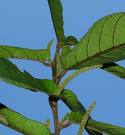
Record display
 PROTA4U Homepage
PROTA4U Homepage Select translation pop-up: Select translation pop-up: |
 |
PROTA4U Record display |
 PROTA4U Homepage PROTA4U Homepage
|
| Sp. pl. 4(1): 530 (1805). | |||
| show more data (1) | comments (0) |
| Euphorbiaceae | |||
| show more data (4) | comments (0) |
| show more data (6) | comments (0) |
| Bois queue de rat, bois de crève cœur, bois de Charles (Fr). | |||
| show more data (1) | comments (0) |
| Acalypha integrifolia occurs in Madagascar, Réunion and Mauritius. | |||
| show more data (6) | comments (0) |
| In Réunion and Mauritius a leaf decoction is taken as an astringent and purgative, used to eliminate intestinal worms. A bath in the leaf decoction is taken to treat skin infections. | |||
| show more data (0) | comments (0) |
| The leaves, stems and roots contain saponins, tannins, sterols, terpenes and traces of alkaloids. | |||
| show more data (0) | comments (0) |
| Monoecious shrub up to 2 m tall; branches erect and branchlets spreading, glabrous. Leaves arranged spirally, simple; stipules narrowly triangular, 1–9 mm long; petiole 2–20 mm long; blade elliptical-ovate, obovate-elliptical to oblong, 4–13(–18) cm × 1–4.5(–6.5) cm, base rounded, truncate or cordate, apex acute to obtuse, margins toothed, membranous, glabrous, pinnately veined, green, sometimes with red margins, or green above and purple to red below. Male inflorescence an axillary, solitary spike up to 20 cm long, many-flowered, flowers in groups, peduncle short, shortly hairy; female inflorescence an axillary cluster, 1–5-flowered, bracts broad, obovate, 2–5 mm long. Flowers unisexual, sessile, petals absent; male flowers with 4-lobed, minute, almost glabrous calyx, green to reddish, stamens 8, free, anthers curled; female flowers with 3 minute sepals, ovary superior, covered with fleshy spines, 3-celled, styles 3, fused at base, deeply fringed, red. Fruit a 3-lobed capsule 3–4 mm long, spiny. Seeds ovoid, 2.5–3 mm long, pale brown. Acalypha comprises about 460 species and occurs throughout the tropics, subtropics and warm temperate regions, excluding Europe. In tropical Africa about 65 species occur and in Madagascar and other Indian Ocean islands about 35 species. Acalypha integrifolia is a variable species and 3 subspecies and 7 varieties have been distinguished. Several other Acalypha species with medicinal uses are endemic to the Indian Ocean islands. A leaf decoction of Acalypha lyallii Baker, from Madagascar and the Comoros, is used to massage parts of the body to treat rheumatism. A decoction of the aerial parts or stem bark of Acalypha andringitrensis Leandri and Acalypha radula Baill., both from Madagascar, is taken or inhaled to treat fever and syphilis. The crushed leaves are topically applied to treat scabies. A leaf infusion of Acalypha decaryana Leandri from Madagascar is taken as a purgative to treat dysentery. A decoction of the leafy stems of Acalypha spachiana Baill. from Madagascar is taken to treat venereal diseases. The flexible stems are used to make baskets. The stems also yield a black dye. | |||
| show more data (0) | comments (0) |
| Acalypha integrifolia occurs in shrub land from sea-level up to 1000 m altitude. | |||
| show more data (0) | comments (0) |
| Acalypha integrifolia is relatively common and not threatened by genetic erosion, although several of the subspecies and varieties are restricted to small areas and/or known from few collections. | |||
| show more data (0) | comments (0) |
| Acalypha integrifolia is only occasionally used as a medicinal plant and is likely to remain of local importance, unless new pharmacological research reveals interesting pharmacological activities. | |||
| show more data (0) | comments (0) |
| • Boiteau, P., Boiteau, M. & Allorge-Boiteau, L., 1999. Dictionnaire des noms malgaches de végétaux. 4 Volumes + Index des noms scientifiques avec leurs équivalents malgaches. Editions Alzieu, Grenoble, France. • Coode, M.J.E., 1982. Euphorbiacées. In: Bosser, J., Cadet, T., Guého, J. & Marais, W. (Editors). Flore des Mascareignes. Familles 153–160. The Sugar Industry Research Institute, Mauritius, l’Office de la Recherche Scientifique Outre-Mer, Paris, France & Royal Botanic Gardens, Kew, Richmond, United Kingdom. 117 pp. • Gurib-Fakim, A. & Brendler, T., 2004. Medicinal and aromatic plants of Indian Ocean Islands: Madagascar, Comoros, Seychelles and Mascarenes. Medpharm, Stuttgart, Germany. 568 pp. • Lavergne, R., 2001. Le grand livre des tisaneurs et plantes médicinales indigènes de la Réunion. Editions Orphie, Chevagny sur Guye, France. 522 pp. | |||
| show more data (1) | comments (0) |
| • Adjanohoun, E.J., Aké Assi, L., Ali Ahmed, Eymé, J., Guinko, S., Kayonga, A., Keita, A. & Lebras, M. (Editors), 1982. Médecine traditionelle et pharmacopée - Contribution aux études ethnobotaniques et floristiques aux Comores. Agence de Coopération Culturelle et Technique, Paris, France. 217 pp. • Neuwinger, H.D., 2000. African traditional medicine: a dictionary of plant use and applications. Medpharm Scientific, Stuttgart, Germany. 589 pp. • Pernet, R. & Meyer, G., 1957. Pharmacopeé de Madagascar. Publications de l’Institut de Recherche Scientifique Tananarive-Tsimbazaza. Pierre André Impr., Paris, France. 86 pp. • Said, H. & Petitjean, A., 1995. Pharmacopée comorienne: approches ethnobotaniques et chimiques. Revue de Médecines et Pharmacopées Africaines 9(1): 79–88. | |||
| show more data (0) | comments (0) |
| |||||
| |||||||
| |||||||||||
| |||||||
| Schmelzer, G.H., 2007. Acalypha integrifolia Willd. [Internet] Record from PROTA4U. Schmelzer, G.H. & Gurib-Fakim, A. (Editors). PROTA (Plant Resources of Tropical Africa / Ressources végétales de l’Afrique tropicale), Wageningen, Netherlands. <http://www.prota4u.org/search.asp>. Accessed . | |||
| There are 6 book citations related to Acalypha integrifolia Willd.. Click on "show more" to view them. | ||
| show more data | comments (0) |
| There are 67 citation in web searches related to Acalypha integrifolia Willd.. Click on "show more" to view them. | ||
| show more data | comments (0) |
| There are 5 citation in scholarly articles related to Acalypha integrifolia Willd.. Click on "show more" to view them. | ||
| show more data | comments (0) |
| There are 3 citations in Afrirefs related to Acalypha integrifolia Willd.. Click on "show more" to view them. | ||
| show more data | comments (0) |
| General importance |  |
| Geographic coverage Africa |  |
| Geographic coverage World |  |
| Medicinal use |  |

